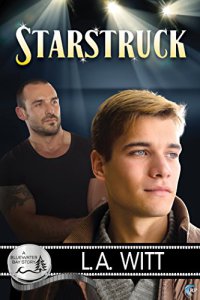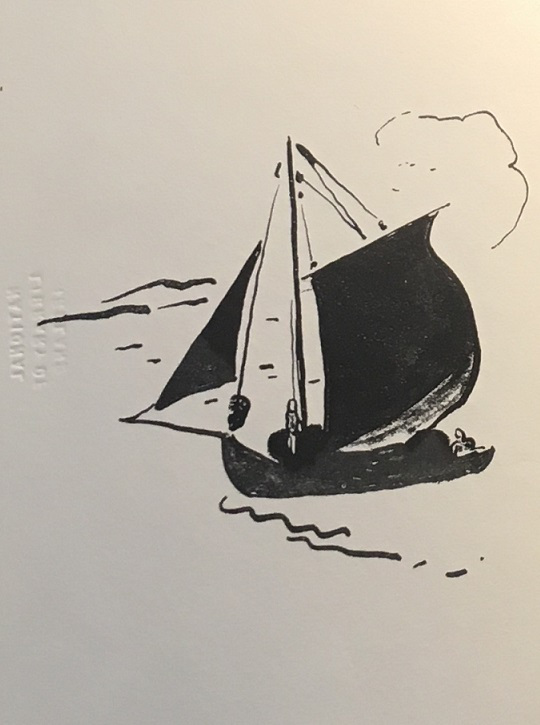The reader boards on the 30-mile stretch of I-5 I travel each Thursday to attend my yoga class, warned last week of high volume traffic and delays over the weekend. Saturday, as I drove on the frontage road parallel to the interstate on my way to visit Mama, the I-5 traffic was heavy and slow. Why? Travelers heading to the tiny town of Madras, Oregon—and other small Oregon towns—to view the total eclipse of the sun.
Karen Maezen Miller writes in her blog post “eclipsed“: “It’s not surprising that it seems reasonable [to do something crazy] and wait for the split second when something truly remarkable could happen.” When you think about it, we do a lot of crazy things for the good moments, and overlook the cost. I have driven for hours and endured sore muscles this summer to climb mountains. What can I say?
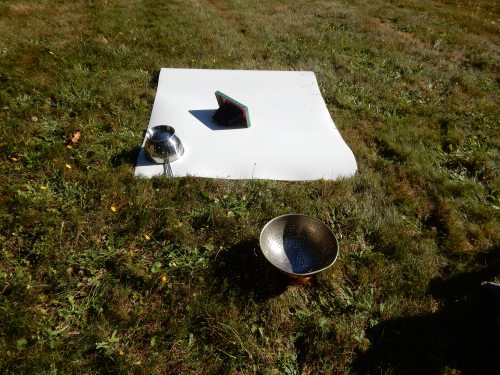
“Are you coming or going?” Mama has had the greeting stuck in her head for many weeks and pulls it out—only for me, apparently—when I arrive to visit her. I guess I’m obtuse. Rebecca says she understands, but I good and truly have been at a loss as to how to respond. Finally last week I asked her what she means when she asks me that. “I’m not irritated,” I said when she accused me of such just for asking the question, “I don’t understand. When I come in the door I’m always coming…to see you. When I leave, I’m going.”
In confessing that, I know I set myself up for accusations by readers of being overly particular about semantics. She’s old, give her a break, I hear you saying. But I wanted to know what kind of response she was looking for. She said she didn’t know if it was yoga day or hiking day or what have you. Okay, I get that, the fact that I don’t see her on those days not withstanding. I still don’t know how to answer.
The question challenges my desire to be present in the moment, to not always be coming from or going to something else. I told her that, but she was stuck on feeling that I was criticizing her.
“Well, what do you want me to say?” she asked petulantly.
“You could say, ‘Hello, I’m glad you’re here,” I suggested.
“I’ll just say ‘hello,’” she countered.
The next day when I announced my arrival, stating my name because she has no clue who comes in the door, she said, “What are you up to today?” Then, “Oh, I’m not supposed to ask that.” I told her that was a great greeting. It opens a conversation, and is one I can turn back to her as well. This is what I have been doing, this is what I will be doing, and right now I’m in this moment here with you. Is that semantics? Maybe, but it sure feels different to me. And since she was able to remember I had requested a different greeting, and figure out a different one, I am not going to victimize her with a “she has dementia” excuse not to learn new tricks. She probably struggled to come up with it all the 24 intervening hours.

How long did the eclipse last? In Madras, 2m, 2s. I checked Google Maps Saturday evening: from Seattle, the drive time was 5h, 56m, via a route that “avoids crashes on I-5S,” an hour or so longer than it usually is. And then all those people had to return. (My Airbnb guests were three hours later than they expected to be.) I will be close to Madras next week when I go camping in the Mt. Hood National Forest. It will be a sleepy little town again, its two minutes of fame over, nothing left but trash pick-up.
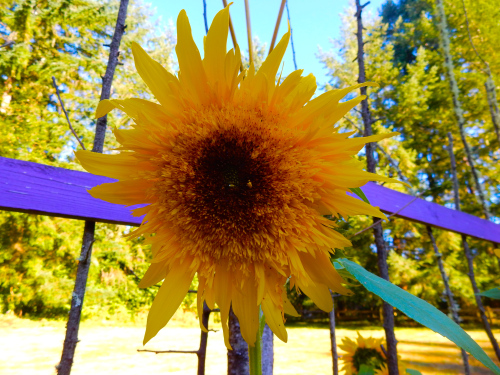
Rebecca and I experienced the dark during the 94% eclipse from the meadow at Three of Earth Farm—without looking at the sky, since we had no glasses. As we walked up to the meadow with our various props before the 9:07 start time, we noted the complete lack of clues that something momentous was about to happen. The sky was blue, the sun was doing its normal shining thing and casting shadows of the trees, birds were singing.
“What if it’s all a hoax?” Rebecca said. “Maybe perpetrated by big oil to get people in their cars driving long distances.”
“Or cereal companies encouraging people to empty their breakfast boxes, then have to buy more cereal,” I theorized.
“I bet it’s fake news,” Rebecca said.
(Another blog I enjoy is Heather Lende’s musings from Haines, Alaska. In her post this week, “The Path of Totality,” she quoted a biologist as musing that the same people who ridicule the idea of climate change had no trouble believing, even praising, scientists’ prediction of the eclipse.)
We spread out our white screen on the grass and I tried to get the sun to cast a magnified shadow on it with my father’s WWII German binoculars secured into a piece of cardboard as seen on NPR. They said you can look at the sun anytime this way. Nothing. 9:07 was approaching, and we had zip.
Then, at exactly 9:07, there was a flicker of something bouncing in the corner of the screen. “There is is!” Rebecca shouted. Oh my goodness! I slowly moved the binoculars around until it was captured on the screen. It was amazing!
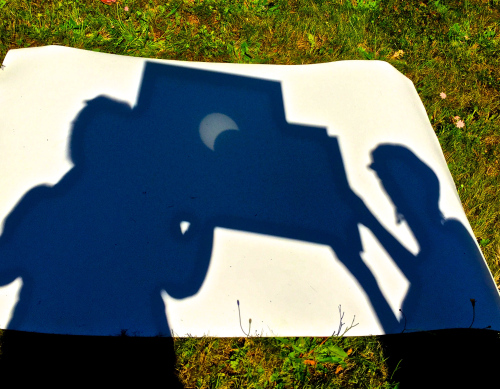

Once I knew it was going to work, I ran to the neighbor’s house to see if Robert wanted to join us, and called the other neighbors. They all came, Robert with his Panko box viewer. The world got darker, the temperature dropped suddenly, and we five plus Gracie the Dog watched the shadow of the sun being swallowed by the shadow of the shadow of the moon. I have to say, it was exhilarating and awing.

Although I had no desire to crawl along the interstate, I admire those who chose to seize those two minutes of time to experience a remarkable event, however crazy. Not remarkable in that it’s rare—it’s not. But the chance of any one person seeing it again is less likely. There was one in the PNW in 1979, but I lived in Virginia then. There is a total eclipse due here in just seven years, but it could be cloudy or I could be gone. All we have for sure is this moment.
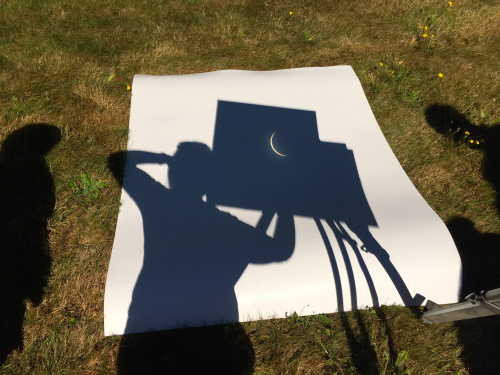
Mama had said she would be afraid, “with my vision,” to be outside during the event. I tried to explain it’s not dangerous if you don’t look at it. (And at less than totality, it was no more possible to look at it than to look at the sun any time. Also, she is already blind.) So she didn’t leave her room, didn’t notice notice the eerie semi-darkness (which she would not have anyway, her world is always semi-dark), didn’t notice the 10º temperature drop, didn’t experience the experience, didn’t live the moment.

We seized the moment. We weren’t coming from or going to anything else. We were right there. And then it was over. The birds sang again, the temperature jumped back up, the light returned. We went home, back to our lives. I went to visit Mama and tell her all about it.
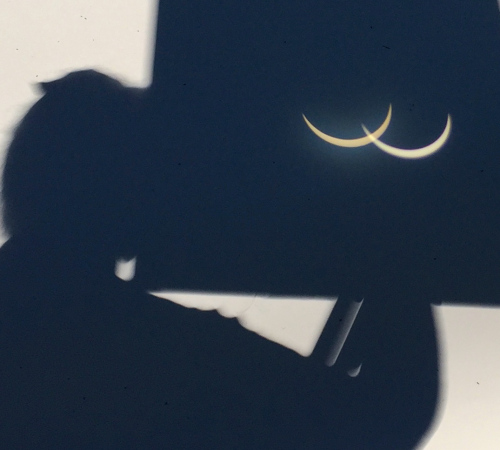
Advertisements Share this:

